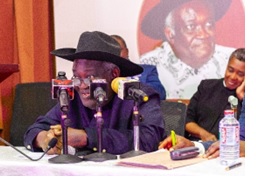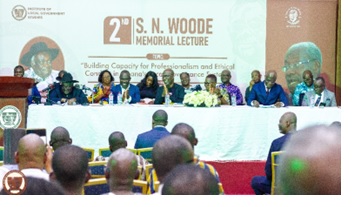 29th August, 2025: In a bid to promoting professionalism and ethical conduct in local governance, a renowned Ghanaian Local Governance Scholar and Politician, Prof Kwamena Ahwoi, has called for intensive and comprehensive capacity building interventions on ethics and professional conduct for all actors and practitioners in the local governance sector including Assembly members, Unit Committee members, professional and non-professional staff of the Regional Coordinating Councils and District Assemblies, chiefs and traditional authorities, Civil Society Organisations, Faith-Based Organisations, Non-Governmental Organisations and Community-Based Organisations.
29th August, 2025: In a bid to promoting professionalism and ethical conduct in local governance, a renowned Ghanaian Local Governance Scholar and Politician, Prof Kwamena Ahwoi, has called for intensive and comprehensive capacity building interventions on ethics and professional conduct for all actors and practitioners in the local governance sector including Assembly members, Unit Committee members, professional and non-professional staff of the Regional Coordinating Councils and District Assemblies, chiefs and traditional authorities, Civil Society Organisations, Faith-Based Organisations, Non-Governmental Organisations and Community-Based Organisations.
The move he indicated would not only promote transparency and accountability but also enhance governance effectiveness and improved delivery of basic services at the local level. Prof Ahwoi was speaking as the lecturer at the 2nd Memorial Biennial Lecture of Professor Samuel Nunoo Woode, the founding Director of the Institute of Local Government Studies (ILGS) in Accra.
‘’I must stress that local governance is at the front-line of the country’s governance architecture, the governance structure that is closest to the people, and its practitioners must therefore present themselves as ethical role-models before the people with whom they interact’’ he said.
 He therefore emphasized that the Institute should partner with the various stakeholders in the local governance sector, including the National Association of Local Authorities of Ghana (NALAG), Civil and Local Government Staff Association of Ghana (CLOGSAG), Local Government Workers Union (LGWU), Chamber of Local Governance (ChaLOG), Conference of MMDCEs, and the Association of Presiding Members to propel the campaign to ensure professionalism and ethical conduct within the local governance landscape.
He therefore emphasized that the Institute should partner with the various stakeholders in the local governance sector, including the National Association of Local Authorities of Ghana (NALAG), Civil and Local Government Staff Association of Ghana (CLOGSAG), Local Government Workers Union (LGWU), Chamber of Local Governance (ChaLOG), Conference of MMDCEs, and the Association of Presiding Members to propel the campaign to ensure professionalism and ethical conduct within the local governance landscape.
 While acknowledging the immense contribution of ILGS in leading the charge of capacity building for effective local governance, he recommended among others that there was the need for the Institute to decentralize or regionalize the delivery of training as well as introduce a training of trainers’ programme to ensure the country attains the ideals of “the more the trainers the better the training”. He cited the example of how the country benefited from the United Nations Development Programmes (UNDP) in its early efforts at decentralisation with the establishment of 10 Regional Mobile Planning Teams that built district level capacity in decentralized planning and local development. A similar approach, he said, could be adopted through a Regional Mobile Capacity-Building Team concept, with a focus of enhancing professionalism and ethicality in Ghana’s local government system. This, he indicated could benefit from the support of the international partners.
While acknowledging the immense contribution of ILGS in leading the charge of capacity building for effective local governance, he recommended among others that there was the need for the Institute to decentralize or regionalize the delivery of training as well as introduce a training of trainers’ programme to ensure the country attains the ideals of “the more the trainers the better the training”. He cited the example of how the country benefited from the United Nations Development Programmes (UNDP) in its early efforts at decentralisation with the establishment of 10 Regional Mobile Planning Teams that built district level capacity in decentralized planning and local development. A similar approach, he said, could be adopted through a Regional Mobile Capacity-Building Team concept, with a focus of enhancing professionalism and ethicality in Ghana’s local government system. This, he indicated could benefit from the support of the international partners.
Reflecting on the life and legacy of the late Prof. S.N. Woode, Prof Ahwoi described the founding Director of the ILGS as a very studious academic, a man of integrity and dedication who placed great premium on ethics in governance and exhibited traits and values that should be emulated by local governance practitioners in the discharge of their public duties.
The memorial lecture has been institutionalised by the Institute as a biennial event and to be organised together with the family of the late Prof. S. N. Woode as well as the University of Ghana Business School (UGBS) and the Public Services Commission (PSC), to honour the life, legacies and service excellence of Prof S. N. Woode.
 LOCAL GOVERNMENT MINISTER EULOGISES THE FOUNDING DIRECTOR OF ILGS, THE LATE PROF. S. N. WOODE
LOCAL GOVERNMENT MINISTER EULOGISES THE FOUNDING DIRECTOR OF ILGS, THE LATE PROF. S. N. WOODE
 FAMILY OF THE LATE PROF SAMUEL NUNOO WOODE LAUDS ILGS FOR HONOURING HIS LEGACIES
FAMILY OF THE LATE PROF SAMUEL NUNOO WOODE LAUDS ILGS FOR HONOURING HIS LEGACIES


